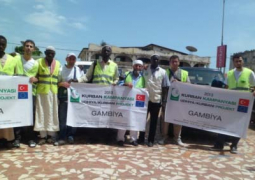
The
United Nations Population Fund (UNFPA) and the Ministry of Health with funding
from UNFPA RHCS Project Plan, Saturday concluded a three-day development
workshop on the 3rd National Reproductive Health Commodity Strategy for The
Gambia 2017-2021.
The
strategy seeks to address The Gambia’s Low Contraceptive Prevalence Rate (CPR)
with focus on Reproductive Health Commodity Security (RHCS).
The
Reproductive Health Commodity Security Strategic Planning workshop held at the
Tendaba Camp in Kiang, in the Lower River Region, was attended by stakeholders
in the reproductive health sectors across the country, including UNFPA
officials.
Speaking
at the workshop, Kunle Adeniyi, UNFPA Chief of Operations, said the strategic
plan would cover the period 2017-2021 and would be based on national
priorities.
He said a participatory approach would be
adopted in the development of the plan through a workshop with key stakeholders
in attendance.
He
stated that the specific objective of the workshop was to review the 2011-2015
RHCS Strategic Plan with a view to identifying achievements, good practices,
challenges encountered in operationalizing the plan, recommendations to improve
the outcome of the successor plan and propose strategic areas for the 2017-2021
strategic plan.
It
was also to reach a consensus on the strengths and weaknesses per component as
identified in the RHCS Strategic Plan; to define RHCS priorities and identify
resource mobilisation strategies; to formulate strategic goal and objective per
component; to identify specific objectives, activities, budget, indicators,
responsible persons, partners and timeline.
Mr
Adeniyi further stated that the workshop was out to formulate an operational
five-year plan (including quantification and costing of RH commodities)
supported by an estimate of funding requirements for RH commodities.
Also
speaking at the workshop was Momodou Mboge, Assistant Country Representative of
UNFPA, who said The Gambia has a population estimated at 1.9 million and annual
growth rate of 3.3 per cent, according to GBoS in 2013.
About 60 per cent of the population lives in
rural area, and women constitute 51 per cent of the population.
The
crude birth rate is 40.5 per 1000 population, while total fertility rate is 5.6
births per woman.
Mr
Mboge also said 31 per cent of women, age 25-49, have given birth by age 18; 49
per cent by age 20, adding that the high fertility level has resulted in a very
youthful population structure, and nearly 42 per cent of the population is
below 15 years and 22 per cent is between the ages of 15 and 24 years.
He
also stated that the Gambia government has put in place several policy
instruments and measures, which include among other things the national RH/FP
commodities security strategic plan 2011-2015.
As
a result of this strategy, RH commodities and drugs are included in government
essential lists uptake enhanced, adding that UNFPA continues to be the main
provider of contraceptives and maternal lives saving drugs in the country.
During
the three-day RHCS Strategic Planning, the development of RHCS Strategic
Planning focused on three key areas, which include service utilisation and
demand creation, and the group looked at how to increase the demand creation to
address the low CPR rate of the country.
Group
members focused on training of the health personnel, sensitization using the
mass media, refurbishment of adolescent youth-friendly centers across the
country, procurement, as well as distribution of RHCS, among other things.
The
logistics group looked at how to put the logistics together, to ensure the
accessibility of commodities to reach the farthest areas of the country on
time, as well as data collection mechanisms to monitor stocks.
It
also looked at procurement of trucks for distribution of the commodities.
The
governance group looked at the policies that are in place for RHCS. It also
looked at printing and reprinting and distribution of those policies among the
health workers, as well as to conduct a meeting with all stakeholders on these
policies.
UNFPA
wants to deliver a world where every pregnancy is wanted, every childbirth is
safe and every young person’s potential is fulfilled.
Read Other Articles In Article (Archive)
We are partners
Oct 24, 2012, 9:36 AM



